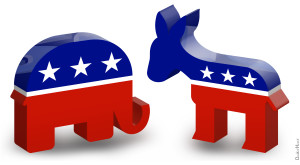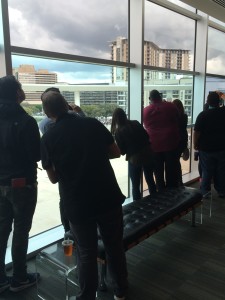There was a fervor in the air on the first day of SXSW Interactive. Obama was appearing. Everybody knew this was big. Hugh Forrest even suggested that it might be the biggest thing to have ever happened at the conference. The lucky ticket-winners, which I thankfully count myself among, waited in line for hours. Eager audience members looked out of the venue’s windows excitedly as the president and his security detail arrived. The excitement in the room was palpable as Obama took the stage to thunderous applause for a Q&A with Evan Smith of the Texas Tribune. The president’s entire appearance can be viewed elsewhere, but here at SXTXState we’re providing the lowdown on three key takeaways from the president’s appearance. Here’s what you need to know.
Obama is funny!
Obama’s keynote opened with a question from Smith about his humorous order at Torchy’s Tacos earlier that day. He playfully recounted his order of three specialty tacos known as the Democrat, the Republican and the Independent. This humorous anecdote set the tone for the rest of the event, which was punctuated by laughter. The following moments were among the comic highlights scattered throughout the remainder of his appearance.
- The announcement, which can be seen in the video below, that he is trying to solve every problem facing this country. His delivery was expert and he appeared simultaneously playful, deadpan and sincere.
- His recounting of the Affordable Care Act website debacle. In a mildly sardonic tone he quipped that the mishap undermined his image as the “cool, early-adapter president.”
- He cracked a rousing “Thanks Obama” joke after recounting the many successes of his presidency, including an unemployment rate that currently sits below 5%.
- When Smith announced that the time allotted for their conversation had ended, Obama bought himself some extra time with a delightful announcement: “I’m the president, so I’m gonna take one more minute.”
Obama is passionate and educated about technology’s capacity to improve lives and he wants government to get involved.
Early in the conversation, Obama made it clear that his appearance was part of a mission to find ways that the government can be involved in harnessing the positive social changes promised by technology. He pointed to past successes, including the digitization and streamlining of applications for both student aid and social security, as proof of his commitment to this cause. His goal is to create a culture that allows the government to institutionalize the innovations generated by talent in the private and non-profit sectors.
He pointed to several positive benefits of collaboration that are already underway. He highlighted a program called ConnectED which aims to bring up-to-date technology into all classrooms and help close the digital divide that exists between populations with varying degrees of privilege.
Multiple partnerships that hold promise if the proposed partnerships are allowed to blossom were discussed as well. Obama suggested collaboration between sectors to combat the recruitment of young people into terrorist activities. He wisely displayed a sense of caution by expressing the desire to keep government out of the business of online propaganda, but expressed the desire to create conditions for innovators in other sectors to take up this battle.
Obama also weighed in on the long-standing conflict between the values of privacy and safety and how that tension might play out in digital spaces. His primary caution was against an absolutist view and he advocated for limited concessions in the digital realm. He pointed to real-world examples, like airport security and mandatory checkpoints, before suggesting that similar measures should be taken when it comes to digital privacy.
“This notion that somehow our data…is different and can be walled off from those other trade-offs we make, I believe, is incorrect,” he said.
Obama got partisan
A key feature of Obama’s appearance was a robust defense of government. He pointed to the importance of improving the government’s digital presence as a means of avoiding disillusionment with the government as a whole.
“An anti-government mentality grows if people feel frustrated because they’re not getting good service,” he said.
He advocated strongly for the development of ways to make civic participation easier, including the ability to both register to vote and cast ballots online.
“We’re the only advanced democracy in the world that makes it harder for people to vote,” he lamented before expressing the belief that people in positions of power in places like Texas maintain systems that make civic participation difficult for certain populations because they are not interested in hearing from them.
He took aim at the right quite pointedly when discussing what the government does for its citizenry. Obama confidently cited counter-terrorism and satellites as examples of government services that right-leaning citizens, libertarians in particular, rely on more than they realize. His still-controversial stimulus package made its way into the conversation as well when he mentioned the criticism it still receives from the right despite its now-demonstrable benefits.
Historic, enlightening and great time. SXSW can count its first presidential appearance a resounding success. Thanks, Obama.

